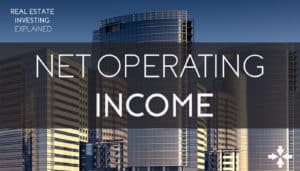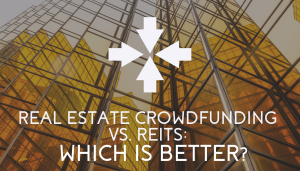FREE TRAINING
What is Real Estate Crowdfunding?
Learn how to build wealth and earn passive income in real estate while someone else does all the work.
What You Need to Know About Apartment Building Investing
By Adam Gower Ph.D.
This article first appeared on the Bigger Pockets Website
Investors new to real estate often ask the same question; should I invest in multi-family properties of 4 units or less, or partner with experienced apartment building investors across a range of projects?
They balance the returns on directly investing themselves which would be higher than partnering with a professional investor, with the risk of using the majority of their capital in just one deal.
The answer to this quandary has dramatically changed in the last few years. Prior to regulatory changes, unless you knew the right people (colloquially were a 'member of the right country club'), you were shut out of the option to invest in anything but that which you can personally afford.
Now that the laws have changed, you have access to a vast array of options.
3 Factors You need to Keep in Mind
Here are three important factors to consider:
1. Liability
When you invest in a local project using all your savings as the down payment you are risking not only that capital but setting yourself up with liability for considerably more. Why? Because you will likely have to guarantee the bank loan you take out which means that if you stop making payments on the loan, the bank will come after you for the debt you owe them.
I personally transacted over $1bn of these kinds of defaulted loans during the downturn of 2008/09 and smaller investors were the hardest hit. When tenants lose their jobs, they stop paying rent, you are then stuck with having to evict which is a time consuming and costly process, not to mention emotionally draining as you are going to be litigating against people you may have come to like and trust and whose personal circumstances are out of their control.
Biggest issue here is that the bank will be less forgiving than you - they have shareholders and federal regulators breathing down their necks, so while you dilly dally with litigation evicting a family whose breadwinner lost his/her job, the bank is demanding you keep the mortgage payment current or they'll take the building from you.
Get access to our FREE weekly newsletter exclusively covering the latest updates from the real estate crowdfunding world
2. Expertise
The most likely way you will make money consistently and for the long run in real estate is to experience some hard knocks. And if you disagree with me on this, it's because you've not learned that lesson yet 🙂
The real estate market is cyclical. Values will go down and it is imperative that you prepare for that inevitability.
Here's how you do that.
* Stress test your assumptions by running best, worst, and most likely scenarios on all your projections.
* Keep your debt levels low and always take out debt with long maturity tails, even if the interest rates are higher than shorter term debt, because this will insulate you against being forced to refinance during a downturn
* Favor properties in areas with higher population density, a growing employment base, and a history of not having declined in value precipitously during the last downturn.
For more information and to gain access to:
- Guided tour of 8 real estate crowdfunding websites
- FREE: Complete list of every real estate syndication website
- FREE: 10 things to look for in real estate contracts
- Access to advanced real estate investment training
3. Diversification
Prior to the regulatory changes (about which I have written a book BTW, Leaders of the Crowd) you really did have to invest all your savings into one deal to get started. Now you can invest a smaller amount across a range of projects thanks to the advent of real estate crowdfunding.
You can go online, research both developers and crowdfunding platforms, and invest in exactly the kind of real estate you want to buy, but instead of putting all your eggs in one basket, you can invest a smaller amount in projects in diverse geographical locations, with different demographics, and operated by different professional development companies.
You technically become a shareholder in their development companies which brings with it the following advantages:
* You still collect profits from rents,
* You have zero financial risk beyond the money you invest,
* You have zero management responsibility so you can spend your time focusing on your day job and family,
* If one property under-performs, it could/should be offset by others you invest in in different locations
* You can invest with [Read: partner with] the best developers in the nation whose projects enjoy the benefits of economies of scale
* All you must do to protect your investment, is do your homework going in by evaluating the developer's due diligence - you don't have to do the due diligence yourself. (Remember, the best way to get out of a bad deal, is to not get into it in the first place).
***
There are two options to investing in real estate; become a developer, or partner with one. This option never existed before regulatory changes permitted developers/sponsors to advertise online. Either way, you must learn what it takes to invest in real estate - the financial terms, the management issues, how to conduct proper due diligence - and the main difference between partnering with or becoming a developer is how you apply the lessons you learn.
Newbie
If you want to build your wealth and earn passive income from real estate investing and are looking at deals on marketplace platforms or through developers online, then I recommend you start by the 8 Key Financial terms so you can understand every deal you look at.
The 8 Financial Keys are not only a great way to get started, they are also essential to understanding how you’ll make money in any real estate deal.
You’ll learn the most important financial concepts you need to know in real estate investing that apply to every type of real estate no matter the asset class (office, industrial, residential, hospitality, retail).
Intermediate Investor
If you’ve got some online real estate investments under your belt already and are beginning to receive passive income checks each month, or have been paid off with profit – or (hopefully not) are finding that some deals are not quite panning out the way you expected, then check out this page for a wealth of free resources.
Here I cover everything from beginner all the way to very advanced real estate concepts.
You’ll find podcasts with developers, researchers, professors and other industry experts, detailed articles, and lots of videos, both short and long that are all easily searchable and totally free.
Advanced Investors
I am not shy about being straightforward about real estate investing; it is exciting, lucrative, and can help you build wealth and income as part of your investment portfolio, but it is not without its risks.
As an advanced investor you know this already, so I’ve put together a webinar for you that guides you through one of the most important components of real estate investing: Real Estate Contracts – reading between the lines.
This is advanced learning and based off conversations I had with three of the top real estate attorneys in the country, combined with my own personal experience. Access it here; it could be the most important webcast you watch all year.





